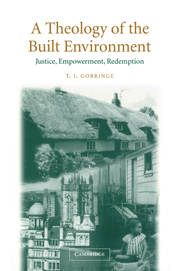Book contents
- Frontmatter
- Contents
- Preface
- 1 The theology of the built environment
- 2 Constructed space and the presence of God
- 3 The land
- 4 The human dwelling
- 5 From Eden to Jerusalem: town and country in the economy of redemption
- 6 The meaning of the city
- 7 Constructing community
- 8 But is it art?
- 9 God, nature and the built environment
- 10 Towards Jerusalem?
- Select bibliography
- Index of names
- Index of subjects
Preface
Published online by Cambridge University Press: 22 September 2009
- Frontmatter
- Contents
- Preface
- 1 The theology of the built environment
- 2 Constructed space and the presence of God
- 3 The land
- 4 The human dwelling
- 5 From Eden to Jerusalem: town and country in the economy of redemption
- 6 The meaning of the city
- 7 Constructing community
- 8 But is it art?
- 9 God, nature and the built environment
- 10 Towards Jerusalem?
- Select bibliography
- Index of names
- Index of subjects
Summary
For nearly a millennium and a half after Aristotle, economics was understood as a sub discipline of ethics. In the nineteenth century this connection was severed, with disastrous consequences for both people and planet from which we are only just beginning to retrieve ourselves. The case was not so bad for architecture and town planning, though even here brutalist and technocratic understandings of the human spread their poison almost everywhere. Wittingly or unwittingly every design for council estates, every barrio, every skyscraper, every out of town supermarket, expresses a view of the human, embodies an ethic. As I have noted in another context, ethics is the conversation of the human race about its common project, about where it is going and why it wants to go there. There are life affirming, but there have also been many life denying, ethical systems. Recognising this, the authors of Deuteronomy called their fellow countrymen to choose between two ways, a way of life and a way of death. We know only too well that there are ways of life and of death in the built environment.
Though they certainly did not get everything right, the authors of Deuteronomy took their stand on belief in the liberating power of the God of life. Five hundred years after they wrote Jesus of Nazareth endorsed that stand. Reflecting on what he stood for, John put into his mouth the words: ‘I am come that they may have life, and have it in all its fullness.’
- Type
- Chapter
- Information
- A Theology of the Built EnvironmentJustice, Empowerment, Redemption, pp. ix - xPublisher: Cambridge University PressPrint publication year: 2002



